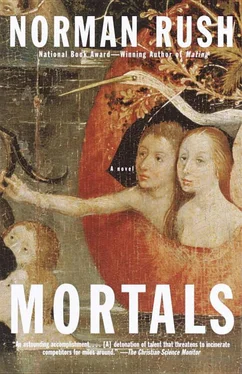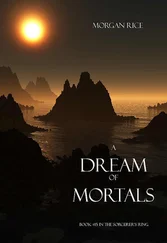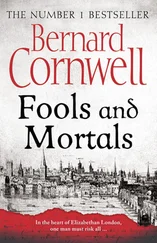The mall hardly represented his idea of the West at its best, so to speak. The mall buildings were standard commercial modern, poured-concrete shoeboxes stood on end, with brick cladding or grooved or fluted or stippled or pebbled plaster facades, all or most of them about the same color as the sand they were built on. Only three or four of the buildings rose to the level of requiring elevators. The British High Commission did, at the head of the cross, and so did the President Hotel, dominating the whole left side of the plaza, looming. And there were three other buildings that did, actually. The mall buildings were less than magnificent. Now he was sounding like an asshole. And the buildings were not wearing well internally. Because people were expected to run up and down five or six flights of stairs routinely, and because doing that rapidly was some kind of fun for a lot of people, there were streams and blotches of handprints and hand grime on the walls of the stairwells at each landing, where people checked themselves on the downward race.
Nor was there anything magnificent about the street-level shops with their oceanic windows and their displays featuring pinspots, half-scrolled sheets of Mylar, and, in the clothing stores, the new faceless and raceless manikins. They were peculiar. Their heads were like grapes. It was the units of the South African chains that were pioneering them and they were now virtually universal. The heads on the manikins modeling women’s clothes seemed to be slightly narrower than the heads on the manikins modeling menswear. Most of the manikins were beige. Some were gray. Some were clear Lucite.
All this could be hell for some and not others, he thought. It would be hell standing up all day in a bank and leafing endlessly through carbon copies of unalphabetized deposit slips. He was passing Barclays.
He felt sorry for the Chinese and Indian bazaars wedged between and fighting and losing against the chains. The bazaars had been there first. They had been all there was, with their bins and racks of merchandise shoved out into the right of way, their hellish repetitive reggae ambiences bulging out over the sidewalks as well, and with their supremely incoherent inventories. The one next to the American Library seemed to specialize, as best he could make out, in sandalwood room dividers, sporting goods, chutneys, and marital aids. Boyle hated Sirdar Varieties and Goods and wanted them out, away from the library, so Ray guessed that they were probably doomed. But Ray thought Sirdar Varieties and Goods added color. The owner’s wife was a heavily scented matron who wore her hair swept back except for a fringe of oily fishhook curls across her forehead. Her husband was obese. He was bearded and when his fat cheeks bunched up in a smile it was like seeing cue balls rising out of a sack. Boyle liked or needed to project terribilità off and on. Ray thought that the habit of doing it might have gotten ingrained in Boyle in his last couple of posts, places where heavy events were more standard than here. Boyle had been in Guatemala and liked it, was the story. And he had been in Kinshasa. Boyle would sometimes allude to Kinshasa, but to Guatemala, never.
He had reached the central plaza, which was about as far as he had time to walk before turning back. In the plaza you were, to a degree, back in village Botswana. A few big cloud trees original to the place had been allowed to remain standing, and under them were tracts of reed mats each one occupied by a vendor presiding over mounds of pigeon peas or groundnuts or pots of fried mopane worms, which he had taken for pots of tiny pretzels the first time he’d seen them. There were vendors selling mealie porridge from washtubs, two vendors today, doing okay. The crowds were thickening. There were beggars around, more these days than before. Some informal system of regulation kept them confined to the forecourt of the main post office and the sinister alleys that pierced the mall rampart at intervals, connecting that mall to the parking strip that ran between the outer face of the mall buildings and the surrounding arterial roads. Beggars in Gaborone weren’t aggressive. They didn’t trail along after their targets or cluster around them the way beggars did in West Africa. They stayed put, looking piteous, which they were, holding out their cupped hands. They were orderly.
There was always something worth noting going on in the plaza, even if it was only something as minor as a new face in the team manning the Botswana Social Front’s literature table. It made things easier that there was only one significant opposition party in the country to keep track of, and that they were so artless. There were two people running BoSo’s table today and he knew who both of them were. The table was in a new location, a better location. Before, they had been by the walkway running past the Capitol Cinema, in the sun. Today they were in a shady alcove next to Botswanacraft. It would have to be seen how long the permission for that lasted.
He turned to go back. There was no time to climb the grand stairway that led from the plaza up to the second-floor terrace café of the President Hotel. It was loud but pleasant up there, under the awning.
It was an open balcony-terrace and you could survey the whole plaza. In the old days someone from one branch or another of the South African security services had almost always been undercover there from noon through seven. You could set your watch by the Boers. How it would work now was going to be interesting. He liked the terrace, whose staircase had been useful to him for crisscross quick-turnover message drops more than once. For old times’ sake he went up the broad steps as far as the first quarter turn and for luck touched the pediment of the newel lamp mounted just where you would put your hand for steadiness if you were hurrying. It was easy to slip something into or out of the slot under the base of the lamp particularly if you planned the crisscross for a moment when the stairs would be packed.
The Capitol Cinema opposite the President Hotel across the plaza was considered magnificent by most of the population. It was still the only movie palace in the entire country. The presidential family had a box permanently reserved for it. The theater was the size of a hangar and its facade glittered with bits of mica and broken glass. A problem was that the atmosphere and protocol established in the audiences who attended the kung fu movies that ran six days out of seven carried over when pictures like Tess of the D’Urbervilles or Chariots of Fire were being shown. Then the foregathered serious expat moviegoing public would be in a state of agony as, say, displays of sadness by white characters were being hugely jeered at. But the Capitol Cinema had its usefulnesses, too. The permanent uproar made it a good place to meet.
For a while the Libyans had used the popcorn seller to pass interesting items to certain people, including a handgun, which unfortunately had spilled out onto the floor along with the popcorn at the feet of a local constable when somehow the recipient of the gun was tripped up by person or persons unknown. He thought O Libya, Libya, give up. There were so many stories about the absurd Libyans that would never be told.
He had to get going.
He was nervous. Admittedly he was nervous. I have this feeling, Iris had said, I have this feeling of wanting to apologize to the world. Then there had been a baffling discussion that he had not been in need of.
He entered the American Library. There would be a wait. Lillian, the librarian, was occupied. The library was empty. He sat down at a reading table, on one of the tubular chairs whose Naugahyde seats were the precise color of Pepto-Bismol.
The discussion with Iris had gone weirdly. When she said she wanted to apologize to the world did world mean social world or natural world, the earth? She wasn’t sure, but mainly she had meant the natural world, maybe . The feeling was with her a lot. Well, why did she think it was? Was it vocational, which was about all he could think of, in the sense that she wasn’t doing anything significant with her inner potential?… but that would be the social world, wouldn’t it? Well yes and no, but it was more the natural world because for example every tree that you saw was a representation of something in nature doing its best . There was something about the environment here, she’d said. It was so difficult for everyone, for everything. It was a very severe place. Then she had introduced a discussion about the term entelechy, discussion about doing your best by your entelechy. No tree is a failure, she had said, and neither were the saplings that don’t make it, they’re both just trees living out their programs, do you wish I were a tree, my dear? Everything was a bucket of fishhooks lately, that he had to get something from the bottom of.
Читать дальше












